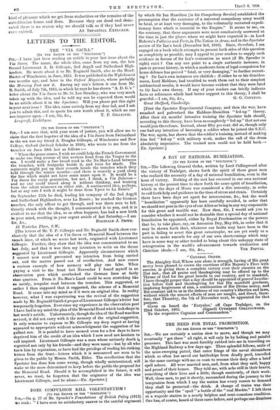DOES COMPULSION KILL VOLUNTARYISM?
[TO TELE EDITOR OF THE SPROUT/n..1
p. 27 of Mr. Spender's Foundations of British Policy (1913) we mad: "1 have seen no satisfactory answer to the careful argument by which Sir Ian Hamilton [in his Compulsory Service] established the presumption that the existence of a universal compulsory army would be fatal, or at least very damaging, to the voluntarily recruited expedi- tionary force which is essential to the Empire." It seems to me, on the contrary, that these arguments were most conclusively answered at the time in just the places where we might have expected it—in Lord Roberts's Fallacies and Facts,in The Nation in Arms, and in the Spectator review of Sir Ian's book (December 3rd, 1910). Since, therefore, I am engaged on a book which attempts to present both sides of this question as completely as possible, may I appeal to your readers to supply such evidence in favour of Sir Ian's contention as must (if Mr. Spender is right) exist Can any one point to a single authentio instance, in past or present history, in which a moderate form of legal compulsion for home defence has proved "fatal, or very damaging," to further recruit- ing ? Sir Ian's own instances are childish : if either he or his Gewahrs- mann, Lord Haldane, had troubled to work them out to their simplest arithmetical results, it would have become evident that they were fatal to Sir Ian's own theory. If any of your readers can briefly indicate facts or references which lend better support to this theory, I shall be grateful.—I am, Sir, &c., G. G. CO1TLTON. Great Shelford, Cambridge.
[First the Spectator Experimental Company, and then the war, have smashed and pulverized the Haldane-Hamilton " fed-up " theory. After their six months' intensive training the Spectator lads should, according to this theory, have been so completely " fed-up" that not one would join the colours. Instead, about fifty per cent. did so, though only one had any intention of becoming a soldier when he joined the S.E.C. The war, again, has shown that the soldier's training, instead of making him feel " fed-up " with military work, makes the call of the drum absolutely imperative. The trained men could not be held back.— ED. Spectator.]


































 Previous page
Previous page